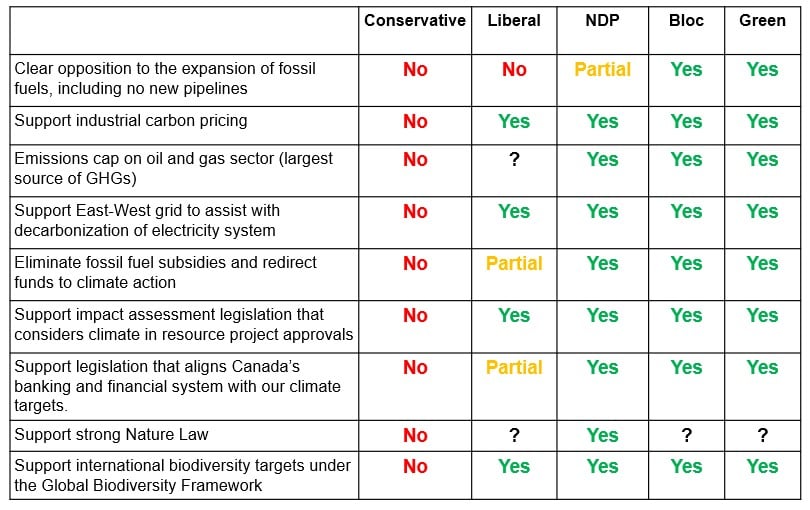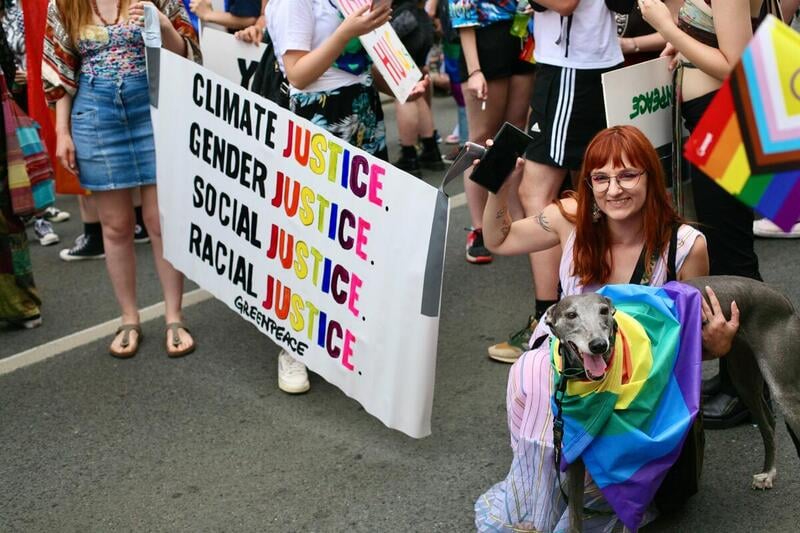
Greenpeace USA climbers form a blockade on the Fred Hartman Bridge in Baytown, Texas shutting down the largest fossil fuel thoroughfare in the United States ahead of the third Democratic primary debate in nearby Houston. The climbers are preventing the transport of all oil and gas through the Houston Ship Channel, home to the largest petrochemical complex in the United States. Their action is a call to the countryÕs present and future leaders to imagine a world beyond fossil fuels and embrace a just transition to renewable energy.
Courageous activists in the United States are at the doorstep of the global oil industry to say there is no place for business as usual in a climate emergency.
Today, 22 Greenpeace USA climbers formed a blockade on the Fred Hartman Bridge in Baytown, Texas, United States, effectively shutting down the single largest fossil fuel thoroughfare in the United States. The protest comes ahead of the Democratic debate tonight in nearby Houston.
Here in Canada, as we head toward national elections, the stakes also couldn’t be higher. We’re in a climate emergency created by fossil fuel CEOs and we need politicians to start acting like it. Call on your federal election candidates to get behind a clean energy transition and Green New Deal for Canada.
Greenpeace is campaigning for a fossil-free future here at home and around the world. Here are five things to know about Texas and U.S. oil production:
1.Texas has made the United States the world’s largest oil producer.
Oil and gas production — particularly from Texas’ Permian and Eagle Ford basins, is on the rise. According to the EIA, oil production in the Permian region has nearly quadrupled from 2010 to today, while natural gas production has more than doubled. This has major climate repercussions, as carbon emissions from oil and gas production in the Permian basin alone could consume one tenth of the entire world’s carbon budget, i.e. the upper limit of how much fossil fuel pollution can be burned before we blow past the boundary of 1.5 degrees Celsius of global warming.

2. More oil is being exported than ever, risking climate catastrophe.
This oil and gas boom not only threatens our climate, but more and more of these dangerous fossil fuels are being shipped overseas to be burned there. The U.S. Gulf Coast became a net exporter of crude oil in late 2018 and the U.S. as a whole is projected to become a net exporter by next year. If the oil from the Permian basin is allowed to flow directly to foreign countries, it would undermine roughly half the progress the United States would make from a shift to clean renewable energy through legislation like the Green New Deal.
3. Houston is the epicenter of exports, corporate profits, and toxic impacts
The number one exit route for these crude oil exports is through the Houston Shipping Channel. One out of every three barrels of crude oil goes out through this channel — nearly 700,000 barrels a day. The area is home to corporate headquarters and major refineries owned by the very companies that have profited the most from the fossil fuels that have caused the climate crisis. It’s no coincidence that spills, leaks, fires, and other environmental disasters are frequent in the Houston region. In 2019 alone there has been a multi-day fire at a facility in Deer Park, a collision between a tanker and two barges that spilled petroleum products into the channel, and two additional fires at ExxonMobil’s Baytown refinery
4. Houston is home to a vibrant Environmental Justice movement
Houston’s petrochemical industry doesn’t go unchallenged. The city is home to a vibrant resistance that we can all learn from. Groups like t.e.j.a.s. (Texas Environmental Justice Advocacy Services) are building power with fenceline communities, fighting to prevent dangerous petrochemical disasters and leaks — while holding corporations accountable for them, and famously organizing ‘Toxic Tours.’ The tours bring people to the East End of Houston, where some of the largest refineries and chemical plants surround neighborhoods and spew toxins into the air. Democratic candidates might learn a thing or two from these tours about fighting for environmental justice.
5. The industry is hellbent on expansion
Even though climate science clearly shows that we must phase out fossil fuels to reach our climate goals, the industry is recklessly ramping up production and infrastructure. There isn’t enough capacity to get all of this oil to the coast, so even as concern about climate change and the urgency to act builds across the country and around the world, fossil fuel companies are planning and building more pipelines and offshore export terminals to turbocharge their last grab for profits at the climate’s expense.
We deserve a world without fossil fuels — a world in which workers’ rights, community health, and our shared climate come before oil company profits. A just transition to a renewable energy economy can create millions of good-paying jobs, without poisoning communities and putting workers at risk to line the pockets of billionaires and investors. If we’re going to survive this climate crisis, we need a reckoning, and a phase out of the fossil fuel industry.
With files from Greenpeace USA





